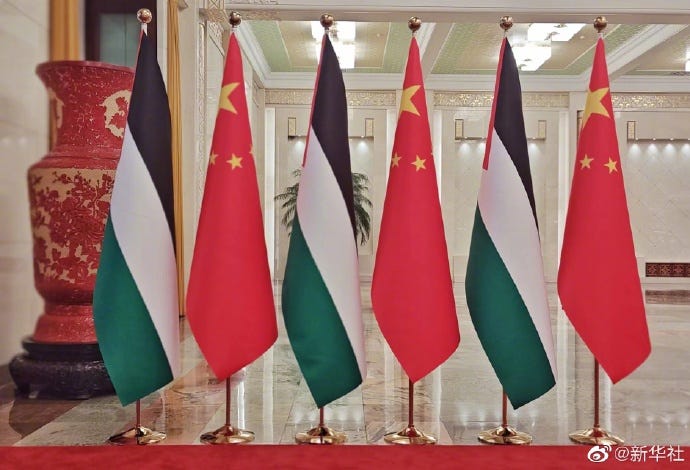PREAMBLE
Palestinian President Mahmoud Abbas (aka Abu Mazen) is on a four-day state visit to Beijing.
On this diplomatic adventure upon which Abbas is venturing a clear message to the American administration by positioning that the Palestinian state is seriously looking for an alternative solution to the Middle East and North Africa (MENA) geopolitical and geoeconomic problems and the attentuating geostrategic issues.
One should look at the existential politico-economic situations in the MENA geostrategic environment as dynamically challenging. A primary aspect, in recent years, Arab countries have increasingly acknowledged and praised China's long-held concepts of "non-interference in internal affairs," "peace through development" “以发展促和平, and "civilizational diversity" 文明多样性; China's development achievements are the envy 羡慕 of the Arab world. Arab nations have reaped huge benefits from the joint development of the Bridge and Road Initiative (BRI) with China.
"China stands ready to play a positive role to assist Palestine in achieving internal reconciliation and promote peace talks," Chinese President Xi Jinping has said, (xinhua, 14/06/2023).
Indeed, Xi puts forward three-point proposal for settlement of Palestinian question:
First, the fundamental solution lies in the establishment of an independent state of Palestine that enjoys full sovereignty on the basis of the 1967 borders and with east Jerusalem as its capital.
Second, Palestine's economic and livelihood needs should be met, and the international community needs to step up development assistance and humanitarian aid to Palestine.
Third, it is important to keep to the right direction of peace talks. The historical status quo of the holy sites in Jerusalem should be respected, and excessive and provocative words and actions should be avoided. A large-scale, more authoritative and more influential international peace conference should be convened so as to create conditions for the resumption of peace talks and contribute tangible efforts to help Palestine and Israel live in peace.
China has further reiterated that the Palestinian question has remained unresolved for over half a century, causing great sufferings to the Palestinian people; justice must be done to Palestine as soon as possible.
Here's an extract on this important state visit as summarised from Discourse Power.
What message is this visit sending?
Abbas is sending a message to the American administration through this visit, saying that the Palestinian side is seriously looking for an alternative to play the role of mediator in the conflict. Consequently, any possibility of conducting peace talks between the two parties under Chinese auspices affects American hegemony in the Middle East.
Secondly, through this visit, Abbas will be able to test the reality of the Chinese desire and its ability to bring about a positive change in favour of the Palestinians in the conflict. Although the visit serves China's interests first and foremost, as it seeks to gain international acceptance and consensus for it as a responsible, benevolent, and alternative superpower to the United States, it is also a Palestinian opportunity.
What else is on the agenda?
Ongoing mutual support in international forums, especially regarding the independence of Palestine, non-interference in internal affairs, and the full membership of Palestine in the United Nations will feature prominently. On the agenda as well will be development issues and joint cooperation in various fields.
Following Palestine joining the Belt and Road Initiative in 2022, a joint committee to discuss free trade was set up and work is underway for Palestine to join the Shanghai Cooperation Organization. These moves will be strengthened with the signing of cooperation protocols in the fields of construction, energy, and health, as well as educational, training, and rehabilitation initiatives for Palestinian youth.
What are the implications for the Middle East?
The newly brokered deal between Iran and Saudi Arabia adds to China's legitimacy as a broker, especially in regard to the issue of Israeli normalization. President Abbas will likely raise the issue of normalization between some Arab countries and Israel and the implications it poses to the Israeli-Palestinian conflict.
Beijing welcomed the Abraham Accords and its regional policies are based on reducing tensions between Mideast countries, and it is possible that China, like the United States, seeks to expand the Arab normalization framework with Israel. The Palestinian president is likely to take issue with this trend, particularly by trying to get China to use its influence to make these agreements to better respond to Palestinian needs.
Related Readings
China relations with the Middle East



